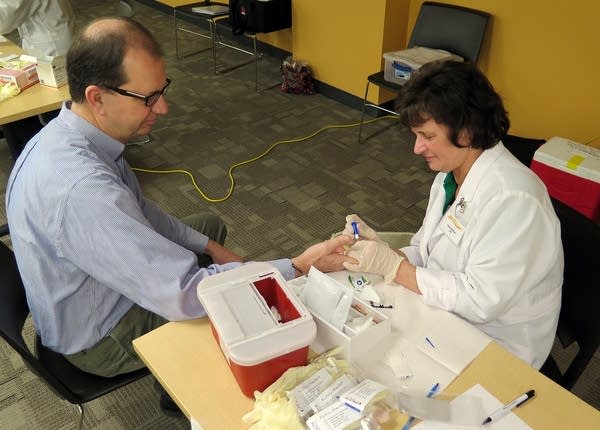Workers embrace employer health perks, but who's really being helped?

Go Deeper.
Create an account or log in to save stories.
Like this?
Thanks for liking this story! We have added it to a list of your favorite stories.
Health screenings and gym discounts are among the perks employers offer workers to stay healthy. But while popular, there's little evidence to show they cut costs significantly or improve worker health.
Health plans have been adding incentives to their insurance offerings for years. Gift cards, a break on gym costs or even lower deductibles are hard to resist.
Critics, though, question whether the people who really need to get healthier are taking advantage. Others worry the programs are moving away from simply rewarding someone for participating to a system that demands workers meet specific goals.
Some wellness programs are imposing greater costs on less healthy workers, who tend to be lower income, said UCLA law professor Jill Horwitz, who specializes in health policy.
Turn Up Your Support
MPR News helps you turn down the noise and build shared understanding. Turn up your support for this public resource and keep trusted journalism accessible to all.
"We've gone from the encouragement to walk, maybe a gift for showing up at the gym or a healthy eating class, to putting real money on the line," she added. "The big worry right now is that employers are saving a bunch of money, but it's possible that the way that employers are saving money is by shifting these costs to employees — in particular shifting them to the employees who are the least well off."
The Kaiser Family Foundation recently found 80 percent of workers with health insurance think their companies should offer wellness initiatives. And a Towers Watson/NBGH employer survey indicates two-thirds of U.S. companies offer programs to promote healthier living among their workers.
Companies are spending more on healthy worker programs because many think improving employee health can save them money, said Cathy Tripp, an executive with the consulting firm Towers Watson.
The survey found most of the employers expect their current health plan to trigger the Affordable Care Act's so-called Cadillac tax on high cost health plans in 2018. So they're under pressure to lower costs. And that pressure is changing how companies design wellness plans.
Typically they offer rewards simply for participation. Tripp, though, said more than one in five has rewards that kick in only if a worker reaches certain health milestones, such as an improving body mass index, blood pressure or cholesterol level.
More companies are similarly raising the bar. The survey found nearly half of employers expect to add so called "outcome-based" incentives.
Honeywell is now requiring employees to submit to blood and other tests to determine in part whether there's evidence of smoking. The Equal Employment Opportunity Commission sued the company, saying an employee who refused to take the tests "could suffer a penalty of up to $4,000."

Health goals may be unrealistic in many cases and forcing workers to meet them is unfair, said University of Michigan health management researcher and consultant Dee Edington.
"Just start eating, just start exercising, just stop smoking. Well, it ain't that simple," Edington said.
Financial penalties are also unpopular with workers. A Kaiser Family Foundation survey found only about one-third think it's OK for companies to charge them more if they don't join a wellness program.
Fairness aside, the incentives do not reduce health care spending, said Soeren Mattke with the Rand Corporation research group.
Mattke analyzed seven years of results of PepsiCo's results. He said promoting healthy behavior did little to rein in costs.
"The bottom line is that targeting risk factors such as smoking, exercise, poor nutrition may reduce those risks, but does not reduce health care spending."
Money-saving happens when companies help employees manage chronic diseases, such as diabetes or high blood pressure, Mattke added.
Despite such findings, there are no signs employers are losing enthusiasm for healthy worker programs.
Ramsey County workers, for instance, can get $20 off doctor visit co-pays if they agree to take an annual health assessment and complete one of several health programs. Nearly two-thirds of employees took the deal this year, part of the county's worker health incentive package.
At a recent Ramsey County employee health fair put on by HealthPartners, the county's health insurer, workers could get their blood pressure, blood sugar and cholesterol checked.
"I think it's a great opportunity," county worker Michael Steward said. "They come right to the facility. It's an opportunity to get a quick check-up in the beginning of the year which sets the tone for the rest of the year."
Steward says he's been taking part in the county's various healthy worker programs for five years.
"They do feel like they're getting help with issues they have around health," said Sam Howell, human resources supervisor for the county. "I think that it makes them feel better about the employer."



